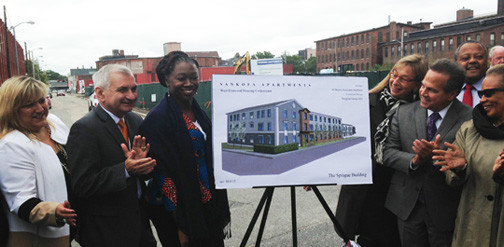Turning the decay of vacant lots into affordable homes, urban gardens
New Sankofa Development creates a new urban landscape in Providence, connecting food and neighborhoods into a vision of a healthy community
PROVIDENCE – The $13.8 million Sankofa Development in the heart of the West End will soon transform nine vacant lots into 50 affordable rental homes in 11 buildings as well as create a community agricultural hub to support the Sankofa World Market.
The project’s financing has been braided together from a variety of sources, including federal Low Income Housing Tax Credits, Rhode Island Housing’s federal HOME program, the Building Homes Rhode Island state bond referendum, and predevelopment funding from RI LISC, NeighborWorks America and Rhode Island Housing.
But the vision came from Sharon Conard-Wells, the long-time executive director of the West Elmwood Housing Development Corporation, and her team at the community development entity, who have shepherded a vision of neighborhood that reflects the needs of the community.
The Sankofa project seeks to change the equation of the neighborhood’s health equity, the fact that the zip code often determines how well you’re going to live and how long you’re going to live. The 50 new affordable rental apartments, together with the new urban gardens and a permanent location for the Sankofa World Market, would help to transform what’s known as the social and economic determinants of health.
Sankofa is a Ghanian word that translates to: “go back and get it,” and it reflects the tenacity of that vision. The West End has become what many have dubbed the “cultural capital” of Providence, reflecting its diversity, where some 40 percent of the residents were born in another country.
“We’ve got good people living in our neighborhood,” Wells said, who served as emcee at the event on Oct. 5, held at the intersection of Harrison and Westfield streets, with a backdrop of a gritty landscape of former industrial brick buildings that were once the economic lifeblood of the residents, in the midst of transformation.
Building trust
There were a host of dignitaries on hand attending the ceremony: Sen. Jack Reed, Rep. David Cicilline, Providence Mayor Jorge Elorza, Barbara Fields, executive director at Rhode Island Housing, Jeanne Cola, executive director at RI LISC, Deborah Boatright, the regional vice president of NeighborWorks America, and Robert Charest, senior vice president of Boston Financial Investment. Angela Ankoma, the chair of the West Elmwood Housing Development board, and a community resident, welcomed everyone.
There was also a strong sense of community, trust and good humor evident, despite the brisk morning chill, when the normally unflappable Wells introduced Reed as Rhode Island’s “senior citizen,” instead of senior Senator, drawing guffaws from everyone, including Reed, who responded, laughing: “I’ve been called worse.”
Reed and Cicilline both praised the collaborative nature of the project.
Elorza began by reminding the participants that he had been born and raised in the West End and how his father had once worked at the former Sprague factory, the site of the development.
Now, a new kind of economic vision was taking root in the West End, Elorza continued, repeating the phrase that the neighborhood was “the cultural mecca” of Providence. In particular, he praised the urban farming opportunities being created as part of the project, to serve as a source of “fresh and healthy foods” for the community.
Fields, in turn, talked about how Wells had stuck to her vision that West Elmwood was going to do urban agriculture, praising Wells’ leadership and resolve.
Boatright called the Sankofa Apartments, together with the Sankofa World Market, as “place-making at its best,” transforming abandoned blocks into a vibrant neighborhood where families can live, learn, work and play.
The ceremony ended with a somewhat anti-climactic unveiling of the plans for the project, with many participants then staying to enjoy a tasty vegetable stew on rice provided by the Sankofa World Market.
The meaning of community
As many of the dignitaries departed, some to their next scheduled event, ConvergenceRI lingered a bit, chatting with a few of those who remained, including Joe Garlick, executive director of Neighborworks Blackstone River Valley, about the difficult challenges of community development in Woonsocket.
That same day, the airwaves of talk radio, local TV and the cyberspace of social media were on fire about an incident that occurred at a Dunkin Donuts store on Atwells Avenue, where a policeman received a cup of coffee, upon which was written, #blacklivesmatter, with a call for a boycott of Dunkin Donuts as a result of the incident.
The two seemingly unrelated events, a coffee cup with #blacklivesmatter written on it, perceived as a disrespectful threat to a policeman’s authority, which in turn prompted an over-heated response, and the ceremony unveiling plans for a $13.8 million project in the heart of a neighborhood known for its cultural diversity, took place literally a mere few blocks away from each other.
But the two events spoke volumes about the difference and the distance in perceptions and reality in Providence and in Rhode Island. And, it exposes the gap in the meaning of community, and what is actually reported as news. It is a conversation that is destined to continue and converge in the days to follow.






